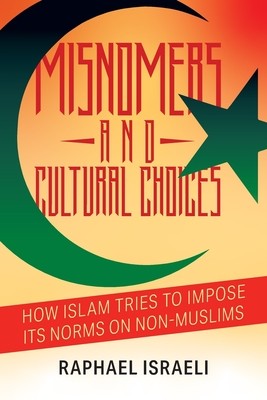
- We will send in 10–14 business days.
- Author: Raphael Israeli
- Publisher: Strategic Book Publishing
- ISBN-10: 1950860035
- ISBN-13: 9781950860036
- Format: 15.2 x 22.9 x 2.5 cm, minkšti viršeliai
- Language: English
- SAVE -10% with code: EXTRA
Reviews
Description
Misnomers are often used in international politics to describe issues and situations that use common words, but carry different meanings. For example, tolerance, suicide bombers, women's equality, and many other words are commonly used by Muslims to make us believe that these words mean the equivalent of the jargon we know, when in fact they cover up dark schemes that depart miles from conventional meanings.
- Tolerance means for us to accept others as they are without value/judgment. For Muslims, it means accepting others (often temporarily), despite their inherent inferiority, until converting or dominating them becomes feasible.
- Suicide bombers for us means terrorists who do not care for human life, and are prepared to kill themselves together with other targeted enemies. For Muslims, these bombers are holy martyrs who sacrifice themselves for the sake of Allah by killing enemies of Islam, and are assured the bliss of Paradise in the proximity of Allah.
- Women are diminished and relegated to a second-rate status in Islam. Women can be beaten and disciplined, while at the same time, equality and special concern is claimed for them.
A wide array of examples and situations of Muslim misnomers are cited and elaborated in the book.
Raphael Israeli has taught Islamic, Chinese, and Middle Eastern history at Hebrew University in Jerusalem. A graduate of Hebrew University in history and Arabic literature, he earned a Ph.D. in Chinese and Islamic history from the University of California, Berkeley. Now retired, he has been a Fellow of the Harry Truman Research Institute at Hebrew University and the Jerusalem Center since the 1970s, and is the author of over 50 research books, a dozen edited books, and 100 scholarly articles about Islam.
EXTRA 10 % discount with code: EXTRA
The promotion ends in 23d.15:36:58
The discount code is valid when purchasing from 10 €. Discounts do not stack.
- Author: Raphael Israeli
- Publisher: Strategic Book Publishing
- ISBN-10: 1950860035
- ISBN-13: 9781950860036
- Format: 15.2 x 22.9 x 2.5 cm, minkšti viršeliai
- Language: English English
Misnomers are often used in international politics to describe issues and situations that use common words, but carry different meanings. For example, tolerance, suicide bombers, women's equality, and many other words are commonly used by Muslims to make us believe that these words mean the equivalent of the jargon we know, when in fact they cover up dark schemes that depart miles from conventional meanings.
- Tolerance means for us to accept others as they are without value/judgment. For Muslims, it means accepting others (often temporarily), despite their inherent inferiority, until converting or dominating them becomes feasible.
- Suicide bombers for us means terrorists who do not care for human life, and are prepared to kill themselves together with other targeted enemies. For Muslims, these bombers are holy martyrs who sacrifice themselves for the sake of Allah by killing enemies of Islam, and are assured the bliss of Paradise in the proximity of Allah.
- Women are diminished and relegated to a second-rate status in Islam. Women can be beaten and disciplined, while at the same time, equality and special concern is claimed for them.
A wide array of examples and situations of Muslim misnomers are cited and elaborated in the book.
Raphael Israeli has taught Islamic, Chinese, and Middle Eastern history at Hebrew University in Jerusalem. A graduate of Hebrew University in history and Arabic literature, he earned a Ph.D. in Chinese and Islamic history from the University of California, Berkeley. Now retired, he has been a Fellow of the Harry Truman Research Institute at Hebrew University and the Jerusalem Center since the 1970s, and is the author of over 50 research books, a dozen edited books, and 100 scholarly articles about Islam.


Reviews